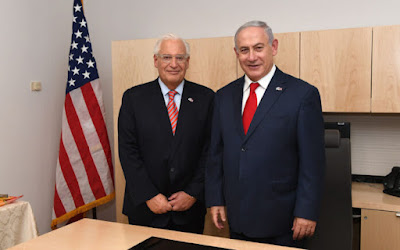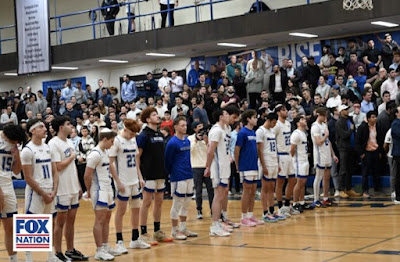The following is an article that I wrote, which appeared in the May 2, 2025, edition of the Baltimore Jewish Times:
 |
Ambassador David Friedman
(Photo credit: wikicommons/U.S. Embassy Tel Aviv) |
His affinity for and deep connections to the Jewish homeland made it an easy decision. When President Donald Trump asked David Friedman to serve as the U.S. ambassador to Israel during his first term in office, Friedman jumped at the opportunity. He ended up serving as ambassador from 2017 to 2021, a tenure that was defined by several significant steps taken by the U.S. relative to Israel and the Middle East region.
On Tuesday, May 6, at 7:30 p.m., Friedman will be the featured speaker at Beth Tfiloh Congregation’s Annual Dahan Lecture sponsored by the Haron Dahan Foundation, where he will discuss the topic of “One Jewish State.”
“Beth Tfiloh takes tremendous pride in the success and prestige of our annual Dahan Lecture, endowed by our visionary benefactors, Mr. and Mrs. Rachel and Haron Dahan. The Dahan family and Beth Tfiloh share an unwavering commitment to Israel and Zionism, and this year’s lecturer, Ambassador David Friedman, follows in our tradition of featuring extraordinary Jewish giants, including Supreme Court Justice Elena Kagan and Natan Sharansky,” said Mandi Miller, chief advancement officer at Beth Tfiloh.
Friedman, who launched the Friedman Center for Peace Through Strength following his service during the first Trump administration, is the author of two books: “Sledgehammer: How Breaking With the Past Brought Peace to the Middle East” and “One Jewish State: The Last, Best Hope to Resolve the Israeli-Palestinian Conflict.”
A longtime attorney, Friedman ruminated on his journey from the legal profession to becoming ambassador to Israel with a bit of levity.
“I get asked a lot by kids who want to follow in my footsteps, who are all really excited about the idea about getting into diplomacy and getting into foreign relations,” he said in an interview with the Baltimore Jewish Times. “And they say to me, can you give me some advice on how to do this? And I say, here’s the advice I could give you. I don’t know how practical it is, but what I would say is, you become a lawyer. You represent a series of wealthy, high-profile clients. You win as many cases as you can, and you hope that one of the clients that you represented becomes president of the United States. And that’s really my path.”
Turning serious, Friedman spoke about how grateful he is to have had the opportunity to serve.
“I practiced law for 35 years, something like that, and I would say a day didn’t go by where I didn’t think to myself, how can I spend a meaningful portion of my life doing things that are important and meaningful to me, important to America, important to Israel, important to the Jewish people. … My father was a prominent rabbi. I think he did great things for the Jewish people and I wanted a little bit of that feeling for myself. And so, to get the opportunity to pivot in a way which is so profoundly meaningful to the state of Israel, to the United States of America, to the Jewish people, was something that I could only see as literally an answer to my prayers,” he said.
 |
| Ambassador David Friedman visits Nevatim Air Base in southern Israel in December 2017. He is accompanied by Brig. Gen. Eyal Greenbaum, the commander of the base. (Photo credit: wikicommons/dvids/David Azagury) |
The lack of foreign policy experience didn’t impede Friedman in any way, as evidenced by what he accomplished as the United States’ representative to Israel.
Friedman, who when presenting his credentials to Israeli President Reuven “Ruvi” Rivlin in 2017, said that, “Serving the United States as its ambassador to Medinat Yisrael is the greatest honor of my life,” was ambassador when the American embassy was relocated to Jerusalem, the U.S. recognized the Golan Heights as sovereign Israeli territory, the Abraham Accords were brokered and finalized and the U.S. declared that the Israeli settlements in Judea and Samaria are not per se inconsistent with international law.
To Friedman, moving the embassy to Jerusalem is the thing he is most proud of.
“It really was a statement, not just to the Jewish people, but to the world, that the United States of America will stand on its values and stand on its principles, and they won’t flinch from the threats of rogue nations. … Peace ultimately is the goal. And what Isaiah was saying in his prophesy is that the road to peace runs through Jerusalem,” he said.
“In retrospect, having done it, not knowing what would happen after we did it, the response from the Arab world was nothing. … Nobody went to war. You had the kind of rudimentary condemnations at the United Nations. But nothing happened. Nothing happened at all. Nothing negative happened, and then something positive happened, which is that for the first time in 25 years, and without giving up one inch of Israel’s biblical homeland, four Muslim nations normalized ties with Israel, which is the Abraham Accords. So, to me, everything got started by moving our embassy to Jerusalem. It just set everything else in motion. If you look at it sequentially, that was the first thing we did,” he added.
 |
| Ambassador David Friedman and Israeli Prime Minister Benjamin Netanyahu at the dedication ceremony of the new U.S. embassy in Jerusalem on May 14, 2018. (Photo credit: wikicommons/U.S. Embassy Jerusalem) |
As for the Abraham Accords, Friedman noted that despite the ongoing Israel-Hamas war and the beating that Israel takes in the Arab press, the agreement has remained intact and none of the Arab nations that normalized relations with Israel have sought to back out.
“Not one of them tried to get out of the Abraham Accords, even though the media in those countries is enormously hostile to Israel,” Friedman said. “And I’ll tell you why. It’s because at the core these countries and Israel have more in common than they have that separates them — they’re all engaged in the war on the same side in the battle against radical Islamic extremism.”
Friedman, who played an integral role in the U.S.-Israel relationship during his ambassadorship, decried recent developments relative to the bond between the two countries. Citing Democratic members of Congress who voted to cut off arms to Israel or who refer to Israel as an apartheid state and a country that is committing genocide, he expressed concern about how the U.S.-Israel relationship has become highly partisan.
“In the aftermath of the election, there was a fight for the soul of the Democratic Party. And a lot of people are saying that for the Democrats to have a future, they have to abandon the far left, the progressive left, the pro-Hamas wing of the party, the anti-Israel wing of the party, and they have to move more toward the middle. And I hope they do. Because what we like to think is that Israel’s relationship with America doesn’t rise or fall every four years on an election. Nobody wants to see that,” he said.
 |
Ambassador David Friedman visits a yeshiva
in the Israeli city of Sderot in October 2017.
(Photo credit: wikicommons/U.S. Embassy Tel Aviv) |
After Rep. Elise Stefanik’s name was recently withdrawn from consideration as the U.S. ambassador to the United Nations, there were murmurs that Friedman was interested in the post.
Noting that, “It’s not my decision and not my call to make,” when asked about it by the Baltimore Jewish Times, Friedman did speak about the prospect of serving in that position with a degree of intrigue and a sense of duty.
“If he [President Trump] calls me, as he did when I was asked to be the ambassador to Israel, and he tells me that this is something where he feels I can make a contribution to strengthen the United States, it’s essentially impossible to say no,” he said. “Once you’ve been involved in public service and you understand how important it is and how you get a once in a lifetime, or maybe in this case, twice in a lifetime, opportunity to really take your values and export them on a large scale and bring them to others, you don’t say no. But I haven’t gotten that call and a lot of other people are qualified, and he’ll make that decision.”
Whether it’s he or someone else in the U.N. ambassador role, Friedman did have a lot to say about the current state of the international body in terms of the pervasive nature of its anti-Israel animus and how the United States should handle it.
“It’s time for the United States to take a very, very aggressive role in what it expects out of other members of the U.N. The U.N. was formed kind of out of the ashes of the Holocaust, to make sure that there was always a place for disputes to be resolved amicably and for wars to be avoided. Well, what a failure it’s been,” he said.
“Since it’s been formed, there’s been nothing but wars, nothing but killing, nothing but acts of real genocide. I’m not speaking about Israel and Hamas, but I’m talking about places like in Africa and in the Far East, where there was real genocide — genocide committed by ISIS and other organizations. So, there has been just enormous suffering all around the world, and the U.N. has done absolutely nothing to stop it. And in fact, they’ve done, as we’re finding out now, a good deal to promote it. We see the connection between UNRWA and Hamas, that frankly, UNRWA fueled a large portion of the Hamas massacre. We’ve seen UNESCO pursue this vile and fake argument that Jerusalem has no connection to the Jewish people.
“Whoever gets this job, I would recommend they come in, they articulate very quickly what they expect out of America’s continued involvement in the United Nations and they try to get that. At the end of the day, if we could fix the U.N., that would be the best outcome. Because the concept of the U.N. is a good one — the idea that before people start shooting at each other, they have a forum within which to talk — but that concept has long ago been buried in the dustbin of history,” he added.
 |
| Ambassador David Friedman delivering remarks at the dedication ceremony of the new U.S. embassy in Jerusalem on May 14, 2018. (Photo credit: wikicommons/U.S. Embassy Jerusalem) |
At the Annual Dahan Lecture, an important evening of Jewish learning and inspiration for the Beth Tfiloh community and the greater Baltimore Jewish community, Friedman plans to talk about his experiences, which he said were greatly enhanced by his familiarity with the Bible.
“To take that [a knowledge of the Bible] and to then bring that to a government position for the United States in which you are responsible for the connections between America and the one Jewish state — the wellspring of all the biblical stories, values and messages that you studied for so long — I don’t think too many people have had that opportunity,” he said.
“There’s a reason why this book has been around for 3,000 years and why we’re called the ‘People of the Book.’ … The book is what’s kept us together. Because for most of the time that we’ve been around, we haven’t had an army, we haven’t had a nation, but we always had the book. And so that book is important. … Being fluent in Jewish history and the Bible, that fluency is the single most important thing that we can give to our children. It’s the way that we will survive.”










